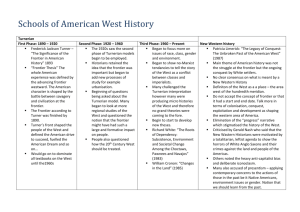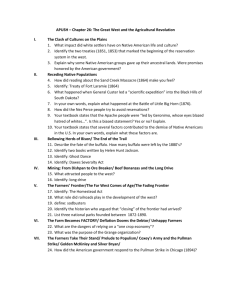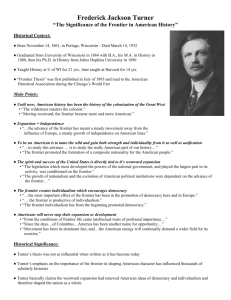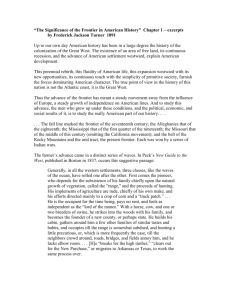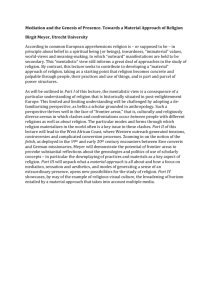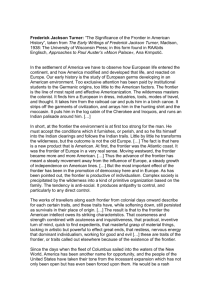From Michael E - Teaching American History in the Northwest
advertisement
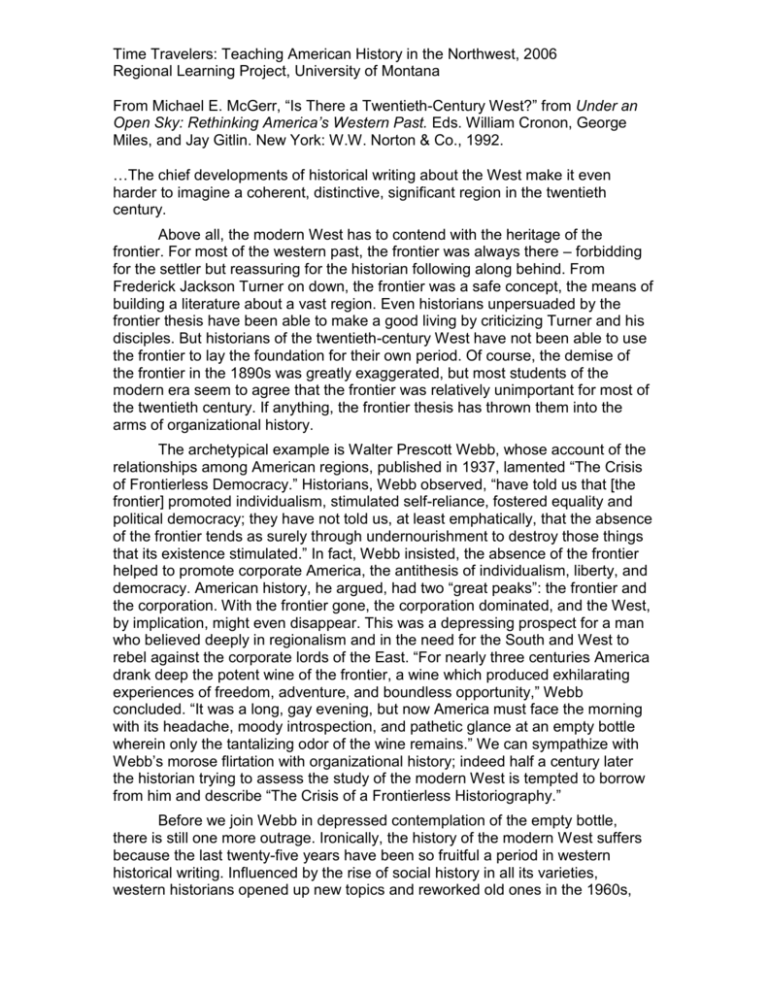
Time Travelers: Teaching American History in the Northwest, 2006 Regional Learning Project, University of Montana From Michael E. McGerr, “Is There a Twentieth-Century West?” from Under an Open Sky: Rethinking America’s Western Past. Eds. William Cronon, George Miles, and Jay Gitlin. New York: W.W. Norton & Co., 1992. …The chief developments of historical writing about the West make it even harder to imagine a coherent, distinctive, significant region in the twentieth century. Above all, the modern West has to contend with the heritage of the frontier. For most of the western past, the frontier was always there – forbidding for the settler but reassuring for the historian following along behind. From Frederick Jackson Turner on down, the frontier was a safe concept, the means of building a literature about a vast region. Even historians unpersuaded by the frontier thesis have been able to make a good living by criticizing Turner and his disciples. But historians of the twentieth-century West have not been able to use the frontier to lay the foundation for their own period. Of course, the demise of the frontier in the 1890s was greatly exaggerated, but most students of the modern era seem to agree that the frontier was relatively unimportant for most of the twentieth century. If anything, the frontier thesis has thrown them into the arms of organizational history. The archetypical example is Walter Prescott Webb, whose account of the relationships among American regions, published in 1937, lamented “The Crisis of Frontierless Democracy.” Historians, Webb observed, “have told us that [the frontier] promoted individualism, stimulated self-reliance, fostered equality and political democracy; they have not told us, at least emphatically, that the absence of the frontier tends as surely through undernourishment to destroy those things that its existence stimulated.” In fact, Webb insisted, the absence of the frontier helped to promote corporate America, the antithesis of individualism, liberty, and democracy. American history, he argued, had two “great peaks”: the frontier and the corporation. With the frontier gone, the corporation dominated, and the West, by implication, might even disappear. This was a depressing prospect for a man who believed deeply in regionalism and in the need for the South and West to rebel against the corporate lords of the East. “For nearly three centuries America drank deep the potent wine of the frontier, a wine which produced exhilarating experiences of freedom, adventure, and boundless opportunity,” Webb concluded. “It was a long, gay evening, but now America must face the morning with its headache, moody introspection, and pathetic glance at an empty bottle wherein only the tantalizing odor of the wine remains.” We can sympathize with Webb’s morose flirtation with organizational history; indeed half a century later the historian trying to assess the study of the modern West is tempted to borrow from him and describe “The Crisis of a Frontierless Historiography.” Before we join Webb in depressed contemplation of the empty bottle, there is still one more outrage. Ironically, the history of the modern West suffers because the last twenty-five years have been so fruitful a period in western historical writing. Influenced by the rise of social history in all its varieties, western historians opened up new topics and reworked old ones in the 1960s, Time Travelers: Teaching American History in the Northwest, 2006 Regional Learning Project, University of Montana 1970s, and 1980s. A host of books and articles studied communities, women, racial and ethnic minorities, and private life as well as politics. As a result, we now have a more pluralistic West, fascinating in its variety. But along with this gift comes the difficulty of summing up all these parts in one “West.” The pieces of the region, we suspect, may never be put back together again. Despite all these historiographical obstacles, there are still hardy pioneers willing to bear the hardships on the real frontier of western history. These writers have tried to raise one sort of regional structure or another on three different foundations: the relationship of the West to the East, the western environment itself, and the western past. In each case the results are true frontier architecture – simple, even a little crude, and vulnerable to the elements.

